Assignment on Health Research Methodology
Added on 2020-04-15
21 Pages5993 Words48 Views
Running head: HEALTH RESEARCH-METHODOLOGYHealth research-methodologyName of the student:Name of the University:Author’s note
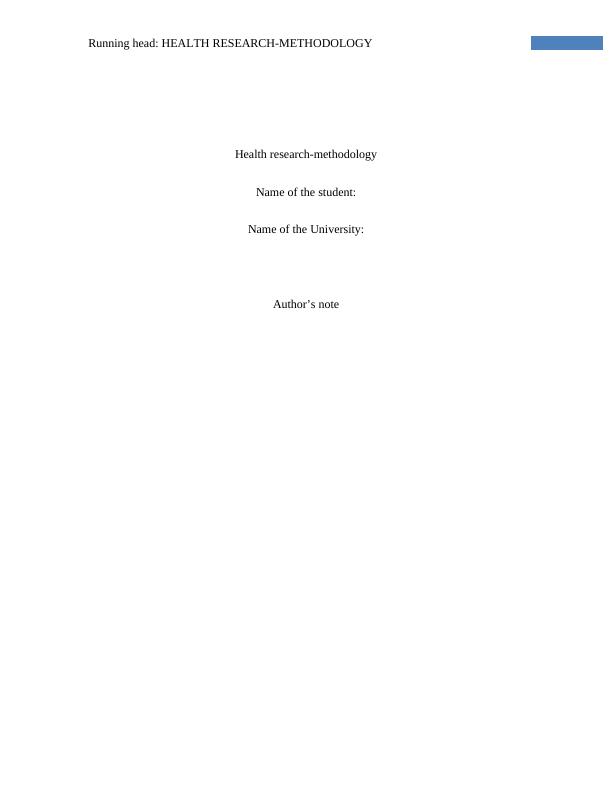
1HEALTH RESEARCH-METHODOLOGYIntroduction:The diagnosis of dementia is associated with great disease burden in elderly populationand caring for such patients brings major challenges for health care professionals. This isbecause it is one of the most serious mental disorders resulting in many challenging medical andpsychiatric issues in patient. Due to significant decline in memory, visuo-spatial function,cognitive and social functioning, dementia patients are highly dependent on health care staffs fortheir care (Wimo et al. 2013). In the context of primary health care system, the problem is thatmany dementia related complications are not easily recognized by health care professionalsresulting in increased risk for patients. Hence, the practice area of specialized dementia care hasemerged (Carduff et al. 2014). However, considering several issues faced in caring for dementiapatients, it has become an active area of research. In order to implement evidence informeddementia care, researchers are now focusing on research in complex areas of dementia care. One of the important research areas that needs to be researched in the field of dementiacare includes the inefficiency of nursing staffs in providing care to dementia patient. As moreand more patients are admitted in hospital for dementia related complications, it is necessary tounderstand the specific challenges that prevent nurse from providing ideal care (Fukuda, Shimizuand Seto 2015). Hence, use of appropriate quantitative or qualitative research methodologywould be critical in exploring the challenges faced in extending care to such patients. Theremight be moral or ethical concerns for health care staffs or some patient related disabilities thatmight be challenging dementia patient (Strech et al. 2013). Therefore, planning specific researchdesign might help to understand whether staffs faced challenges due to organizational factors orpatients related issue or their incompetency in caring for such patients. In response to the
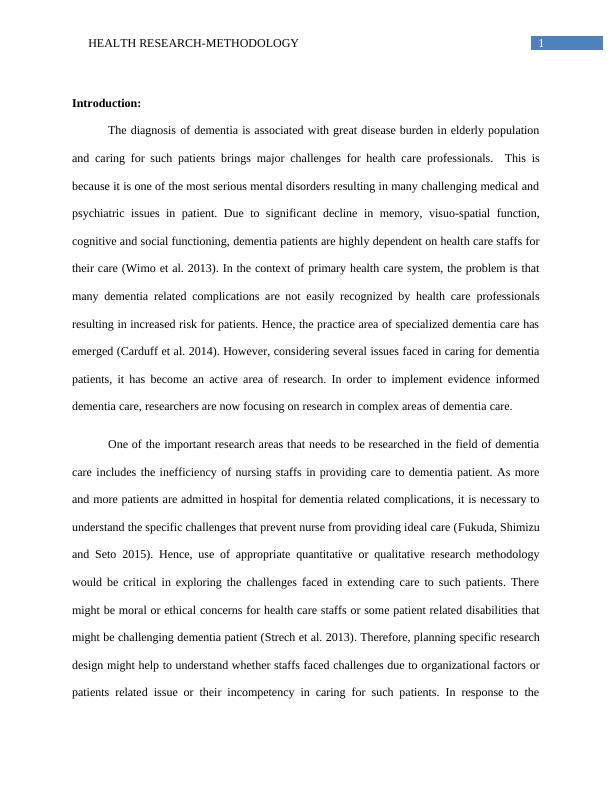
2HEALTH RESEARCH-METHODOLOGYresearch questions of specific challenged facing nursing staffs in caring for dementia patient, themain aim of this report is to critically evaluate the effectiveness of qualitative and qualitativemethodology in getting answer to health care research question. The qualitative methodologychosen for the research topic is phenomenology as it will help to describe the lived experience ofnurses in caring for dementia patient (Corbin, Strauss and Strauss 2014). In case of quantitativemethodology, descriptive research design has been chosen as it will give idea about the currentcompetency of nurse in handling dementia patient. Overview of qualitative and quantitative research approaches in health care researchQualitative research approach is a type of interpretative research technique that focuseson describing and translating naturally occurring phenomena in the social world. Unlikequantitative research methodology which is deductive in nature and aim to analyse frequencyand trend of any phenomena, the qualitative research methodology gives detailed description andmeaning of a phenomenon (Al-Busaidi 2008). Hence, the main purpose of qualitative researchapproach is to collect and interpret data related to experiences and views of participantsregarding a phenomenon. For example, if the research aim is to understand the phenomenonrelated to factors challenging staffs in dementia care, then employing qualitative method will beappropriate in this situation because it will help to get rich data and understand the collectivemeaning of the phenomenon in participant’s life (Silverman 2016). On the whole, it can be saidthat qualitative research is important to go deeper into the problem and uncover new thought andopinion about the problem. There are certain specific characteristics of qualitative research methods in the field ofhealth care. Firstly, the researcher’s interest is to identify the meaning of phenomena related to
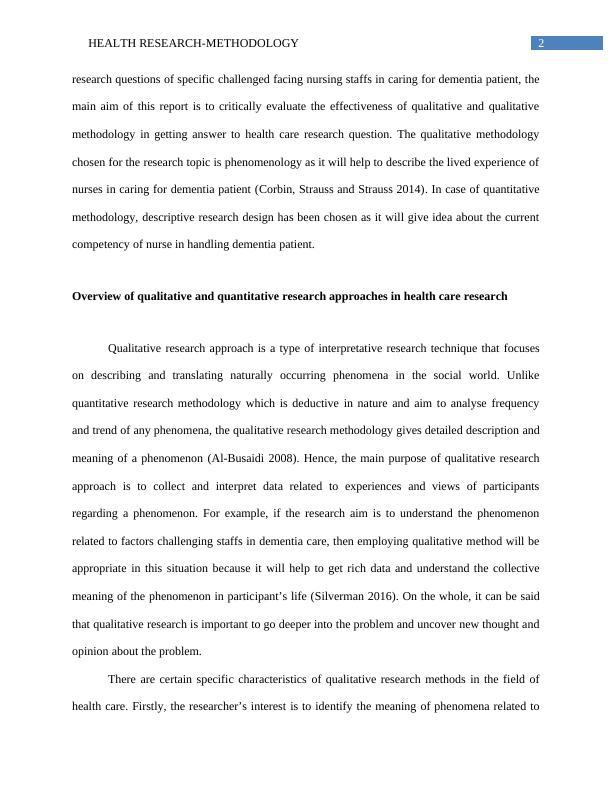
3HEALTH RESEARCH-METHODOLOGYhealth care issues and this kind of research is mainly done in the natural setting of participants(Taylor, Bogdan and DeVault 2015). Qualitative research methodology has greater validity toobecause analysis is depended on data collected from in-depth interview or observation. Hence,there are minimum chances of biasness (Noble and Smith 2015). The uniqueness of thisapproach is that it tries to understand a situation in a particular context and also interprets severalinteractions within the situation. Another important characteristic of this research is thatresearcher is the primary instrument for data collection and data analysis as their judgementdetermines the outcome of research. The third characteristic is that qualitative research favorsconducting research in natural setting (Ormston et al. 2014). Lastly, it employs inductiveresearch strategy which means it used the research data to build abstraction, hypothesis ortheories instead of testing already existing theory. Phenomenology is also one of the importantresearch methodology used in qualitative research (Alvesson and Sköldberg 2017). It also has thesame characteristics of investigating about a phenomenon without any causal explanation orcomparison with preconceptions or preassumptions (Kafle 2013). In contrast to qualitative research, the main purpose of quantitative research method isstatistical analysis of data through polls, questionnaires and surveys. It focuses on determiningthe relationship between a dependent and independent variable either by means of descriptive orexperimental research design (Walter and Andersen 2013). Unlike qualitative research method,quantitative research is done with large sample size and structured research instruments or tools.Clinical trials, surveys with close ended questions and observing and recording well-definedevents are main strategies used for quantitative data collection. Use of relevant research tools andquantitative analysis software helps to maintain rigour in research (Brannen 2017). Quantitativeresearch method is considered to have more utility as the research method is easy to replicate
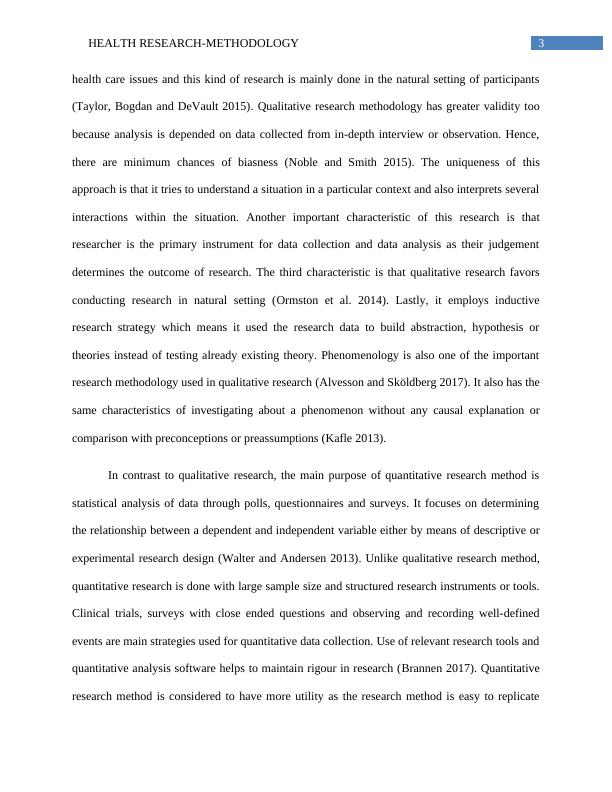
4HEALTH RESEARCH-METHODOLOGYthus contributing to high reliability. By the method of classifying important features related to aresearch topic, numerical data is collected and statistical models are collected to explain theobservation or perceptions of participants (Yilmaz 2013). Critical analysis of quantitative and qualitative methodology for health care researchQualitative study: Among different research methodology, one quantitative research method that can beuseful in conducting research related to dementia care includes the phenomenology approach.Phenomenology is most commonly used qualitative approach in health care research. The mainpurpose of phenomenologic inquiry is to analyze people’s perception about a phenomenon andfind out their view about specific experience (Khan 2014). The usefulness of this methodology isthat it allows researchers to consider a situation from multiple perspectives (Van Manen 2016).For instance, hermeneutic phenomenological approach was used by Tembo, (2015) to evaluateabout experience of critical illness in people suffering from chronic illness and cognitiveimpairment like dementia in the context of daily sedation interruption. Hence, here the mainpurpose was to get detailed idea about theexperiences of cognitive impairment (phenomenon)and uncover the uniqueness of human experience instead of just focusing on measurement andobjectivity. The advantage of using this methodology in the research was that it helped toconceptualize lived experience of critically ill patient. The study showed that people had feelingsof being disrupted, being blacked out, suffering due to hallucination and inability to rememberpast things. This was useful in finding out strategies to minimize sufferings of people in ICU.However, certain limitations were also found in the methodology. For example, small samplesize was used and this also helped in exploring in detail about the experience of critical illness in
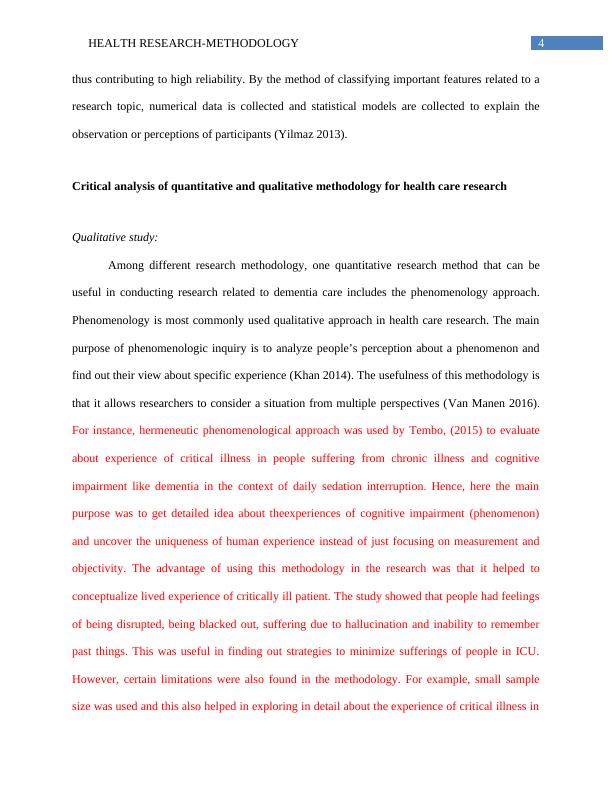
5HEALTH RESEARCH-METHODOLOGYpatients. From the use of phenomenology approach in above research, it is understood that themethodology is useful in elucidating sufferings of critically ill survivors (Chan, Fung and Chien2013). The only limitation found in the use of phenomology approach in this research was that itwas done only in a single setting. Hence, generalizability might also arise as quality andtreatment conditions may not be the same in all health care facilities. One important characteristics of phenomenology methodology is that it tries to giveunified vision regarding the essence of a phenomenon. This indicates the main focus is ondescription of experiences rather than explanation or analysis of the experience. The benefits ofthe methodology according to ethical view point is that it gives respect to individual perspectiveand brings subjectivity in research design. In-depth analysis of phenomenon becomes easier withsuch method and rich data can be collected to identify the cause or reason behind any specificphenomenon (Pietkiewicz and Smith 2014). This is also evident from a research by (Lok,Gunbayi and Buldukoglu 2015) which used phenomenology approach to study about challengesfaced by carers in living with dementia patient. The study was planned in a phenomenologicalpattern by collecting data from participants by means of semi-structured interview. The care’sperspective on taking care of dementia patient was collected and this helped in categorization ofdata into many important domains. For instance, the interview with participants gave detailsabout concept of dementia, experience in providing care to dementia patient, life before healthcare, coping strategies to manage dementia patient and feelings of relative with dementia. Hence,the research design was successful in identify the perspective related to the phenomenon ofcaring for dementia patient and solutions to address the challenges could be identified fromparticipant’s perspective. Hermeneutic phenomenology thus influences pre-existing experienceof researchers. However, the research also points out to the weakness of the methodology due to
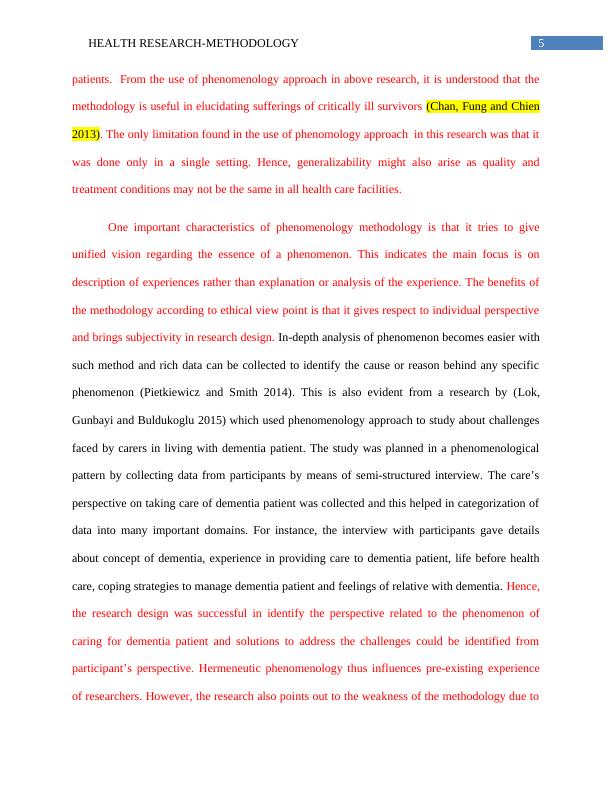
End of preview
Want to access all the pages? Upload your documents or become a member.
Related Documents
Evidence Based Practice in Mental Healthcare: A Case Study of Alzheimer's Diseaselg...
|10
|3601
|413
Preventing Compassion Fatigue among Palliative Care Nurseslg...
|5
|789
|332
Experience of Dementia Patients in Communicating with Nurses: A Literature Reviewlg...
|7
|1542
|270
Exploring Nurse Experiences and Perspectives on Medication Administration Errorslg...
|8
|2525
|76
Importance of Collaborative Nurse-Consumer Relationship in Mental Healthlg...
|10
|2731
|415
Reflection Assignment 2022lg...
|5
|1138
|16
